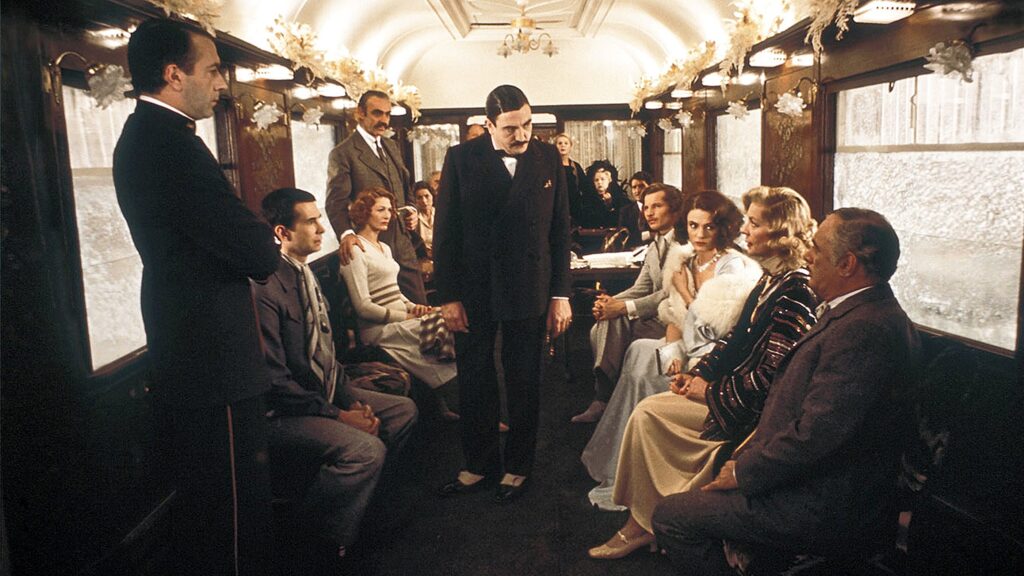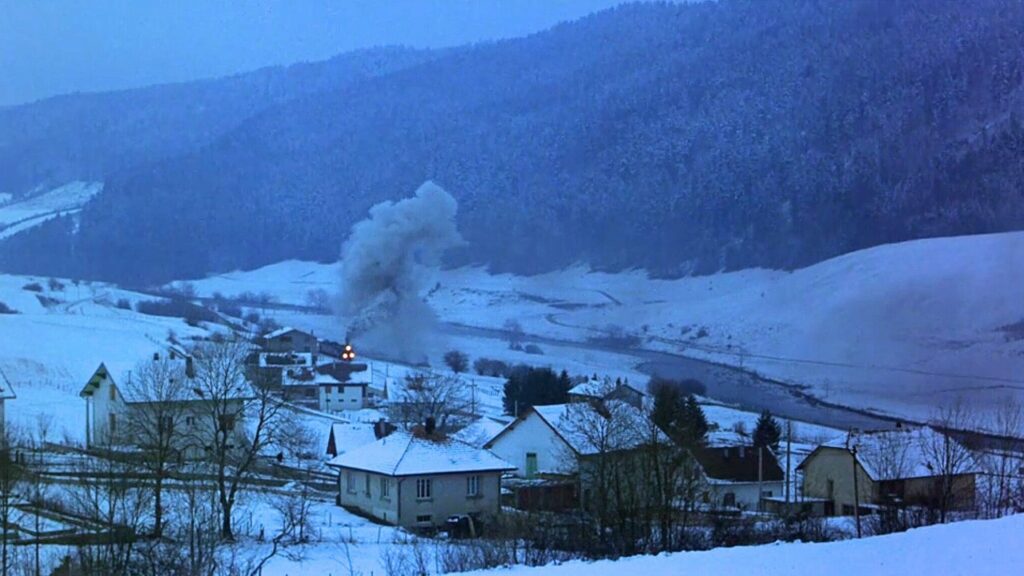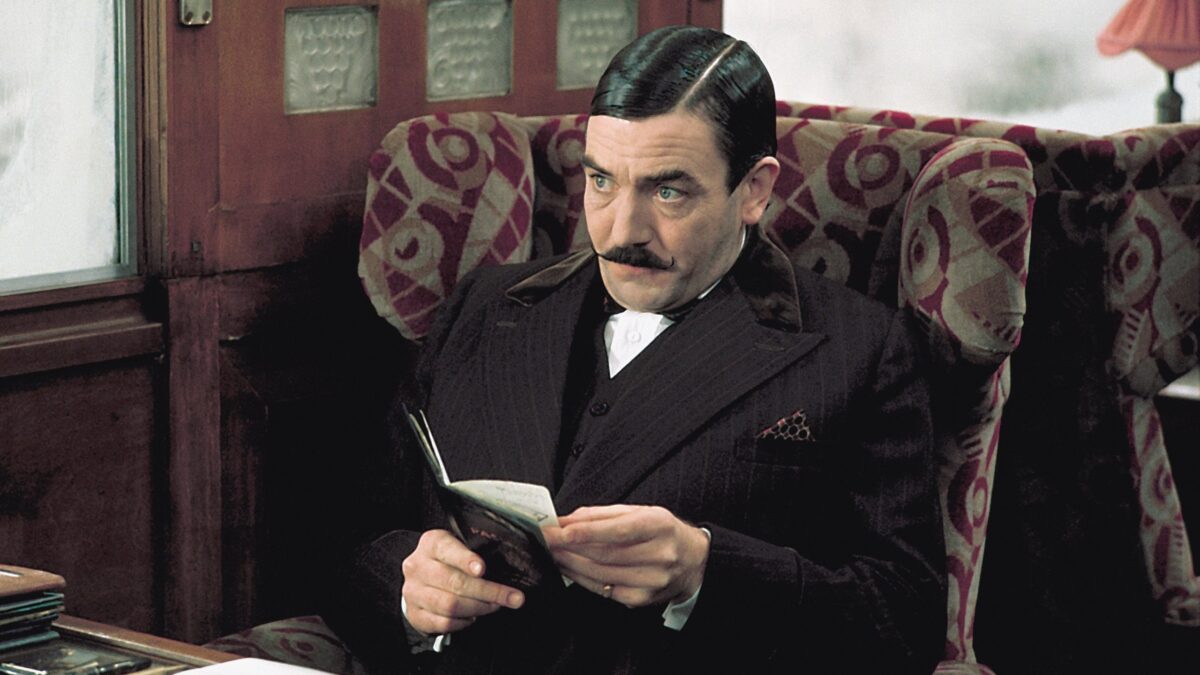"It is the psychology I seek, not the fingerprint or the cigarette ash."
There was always a pretty high floor for the 1974 adaptation of Murder on the Orient Express. Take one of Agatha Christie’s great murder mysteries, hand it to a consummate professional in Sidney Lumet, surround it with a cast packed full of stars and talent, and you’d basically have to work hard to screw it up. Unsurprisingly, Lumet and co. don’t. The film was a critical and commercial hit, netting six Academy Award nominations, including acting nods for Albert Finney as Poirot and Ingrid Bergman (who won), plus nominations for Paul Dehn’s adapted screenplay, score, cinematography, and costume design. It’s as polished and well-oiled as any prestige project of its era that I’ve seen.
In a way, the film now plays as a retroactive counterpoint to Kenneth Branagh’s 2017 adaptation, which I love. Where Branagh zagged toward dynamic energy and psychological investigation, Lumet steers straight down the middle lane. Just the facts. His Orient Express is sterling and orderly: an extremely handsome film assembled with pristine craft. The shots are beautiful, but mostly static. The performances are engaging, but restrained. This classic mystery unfolds with clear beats and stately rhythms, but no surprises. It’s a lovely piece of movie-making that is almost proudly conventional.

If there’s a fly in the ointment, it’s the moustache in the center of it all: Albert Finney’s Hercule Poirot. Finney goes big with the Belgian detective, playing him a bit like a mustachioed Muppet with whimsical energy and aloof overconfidence. It’s entertaining and easy to watch, sure, but Finney’s Poirot doesn’t seem to have much internal life. He’s all mannerisms and stage presence, no crackling darkness underneath that over-fuzzed upper lip. (Speaking of which, Christie herself reportedly grumbled that Finney’s moustache wasn’t nearly fabulous enough, a complaint Branagh overcompensated for in 2017.) It’s not the first time I’ve found Finney at odds with the surrounding material, and his performance puts a limit on my enthusiasm for the film.
The rest of the ensemble is rock solid, though. Lumet pulled in some all-timers: Lauren Bacall, Ingrid Bergman, Sean Connery, Vanessa Redgrave, John Gielgud, Anthony Perkins, and many others fill out the lineup of suspects. But with a cast that big, nobody leaves all that much of an impression. (We must consider Bergman’s win one of those unofficial lifetime achievement Oscars for just-fine work by aging legends.) Everyone gets a scene or two to inhabit a character, then politely retreats to let the next heavy-hitter take the screen. Nobody really disappoints, but the story simply doesn’t allow much room for anyone to pop. My favorite performance comes from Anthony Perkins, who finds a twitchiness and humanity in his role as murder victim Ratchett’s (Richard Widmark) secretary McQueen. (Or maybe I’m just Psycho-brained.)
Even more than my hesitations on Finney, what ultimately holds Lumet’s Orient Express back from greatness is its contentedness with the story as a mere puzzle box. And it is that, of course. But Christie’s novel, under its cozy veneer, also has some dark, philosophical grit. You might even call it an anti-mystery: It deconstructs the very idea of the justice and detective fiction. Every character has blood on their hands. Every alibi conceals a moral compromise. This puzzle isn’t just about finding the killer; it’s about confronting why humans even have laws and the ways we fracture when those laws fail. Lumet’s film, while competently constructed, has little patience for picking at that scab.

Still, it’s a very handsome and polite whodunit. You find stories like this far more often on TV than in film, but they’re never this well-produced when they’re made for the small screen. The production design is first rate both in and out of the train, the costumes are attractive period outfits, and the snowy mountain train exteriors — filmed in real but unplanned snowfall — scratch one of my favorite cinematic itches: I love me a train on film. A train movie is always at least a little bit good by default. Lumet, too, nails the pacing. This is a two-hour movie that flies by, even more than Branagh’s shorter film (which feels longer thanks to its prologue).
Lumet’s Murder on the Orient Express is never less than satisfying in the moment: a polished, old-school entertainment that does exactly what it sets out to do. But it’s also a little safe, and therefore it slides off the brain. Sometimes that’s all you need a mystery story to do, but with Orient Express as with any of Christie’s cream of the crop, we know that more is possible.
Is It Good?
Good (5/8)
Dan is the founder and head critic of The Goods. Follow Dan on Letterboxd. Join the Discord for updates and discussion.


7 replies on “Murder on the Orient Express (1974)”
You say ‘overcompensated’, I say “J’ACCUSE!” for you, my dear Murderino, are a COWARD – how very dare you seek to trammel the most glorious Moustaches in detective fiction for the sake of mere plausibility and common sense!🥸
On a more serious note, I do agree with your review in all it’s particulars – if I had to quantify my reservations about Mr Finney’s good but not great performance as cher Hercule, it’s that there seems to be a hint that thise eccentricities of this Poirot exist to amuse himself, rather than as an extension of his own idiosyncratic personality (As though he takes an amusement in being comically transgressive, rather than genuinely believing, deep in his heart of hearts, that this is how a gentleman is supposed to dress & act and that those fail to recognise this are to be pitied for their lack of perception).
Part of the reason that I rate the late, great Peter Ustinov above Mr Albert Finney when it comes to Poirot is that the former marches on majestically to the beat of his own drum without occasionally squinting around to giggle at the squares.
Out of curiosity, might one please ask if you have any plans to compare the Branagh adaptation of DEATH ON THE NILE with the Ustinov? (Examining all the cinematic Poirot wouod be a full-blown marathon and no error, but I’m hoping that a mere two movies will not be too quite so tedious a labour – especially with one Nino Rota soundtrack in the mix).
Finally, if you ever want to illustrate the difference between a genuinely-iconoclastic POIROT adaptation and a merely unorthodox one, just watch THE ABC MURDERS starring Mr John Malkovich (Which is not entirely without merit, but which nonetheless struck me at the time as quite ruthlessly robbing Agatha Christie of every glimmer of sparkle*).
*A bit like watching THE CASE OF THE SILK STOCKING, a Sherlock Holmes mystery starring Mr Rupert Everett that somehow failed to be much more than a fairly standard Police procedural in period costume (Although it’s rather better than THE HOUND OF THE BASKERVILLES adaptation that had a chance to cast Mr Richard E. Grant as Sherlock HOLMES and absolutely REFUSED to do so – “Too obvious” they said, those fools!).
I am definitely intending to check out Branagh’s second and third adaptations down the line, but knowing I have soemone curious about my takes on the different versions definitely makes me eager to seek out more. I’m not sure I’m up for a full Poirot binge at the moment but I’ll keep it in mind. 😅
If you’re suffering Archive Panic over Poirot, imagine how anyone planning to tackle Sherlock Holmes must feel!👹
Anyway, as mentioned I would never expect you to tackle every single Poirot film in a re-watch: it just struck me that a DEATH ON THE NILE double feature would be reasonably bite-sized and allow you the option to add a third actor to your exploration of what makes for the best screen Poirot.
Also, did I mention the Nino Rota soundtrack? (Actually, one might also add the great Angela Lansbury cheerfully nibbling away at the scenery and the lovely lovely lovely Olivia Hussey being … well, see above … to the possible inducements to see this film*).
*All credit and no little love to Ms Sophie Okenedo, but if Salome Otterbourne isn’t barking mad then your DEATH ON THE NILE adaptation will lower itself in my estimation).
I’ll definitely check out both Niles. I was on the fence about whether to watch the 1978 one, but I looked it up, and apparently Nino Rota composed the soundtrack. You should have mentioned that!
Well I like horses too much to make an offer you couldn’t refuse (Though for the record my favourite of his soundtracks is probably WATERLOO or ROMEO & JULIET).
Also, don’t forget la Hussey!
Any movie fan who doesn’t believe that ‘a train movie is at least a little bit good by default’ is highly suspect, and their taste should be questioned.
Hah. There’s a reason I titled the post kicking off The Goods “All Aboard.”